RIDGY DIDGE GUIDE TO FEEDING FOR HEALTH
What do dogs eat in the wild?
Think about dogs in the wild. What do they eat? Your domestic dog should eat a diet that closely alligns with the food that wild dogs eat, they have both come from the same animal group! Wild dogs kill and eat small animals (large if hunting in packs), birds, lizards - including the bones, and organs which will contain remnants of the herbivors green diet. They also eat grasses, leaves, berries, vegetables and fruit; we know people who have seen dingoes climbing up to pull avocados from trees to eat the flesh!
So what is a balanced dog diet?
Your dog's diet should include free-range meat varieties, including the healthy fat, ground bone and organs for the extra minerals and probiotics. You should also include finely chopped greens for other micronutrients and phytonutrients, about 1/5 volume of the meal, comprising any or all of the following: kale, spinach, parsley, rocket, edible weeds (cobblers pegs, dandelions, chickweed, etc); vegetable tops/leaf/greens from broccoli, beets, celery, sweet potato, pumpkin. Special other extras may include free-range eggs, sardines and natural yoghurt.
So, from the above, you will see that providing a balanced diet is quite a bit of work, and unless you are prepared to put in the effort, you may find it easier to depend on qualified quality food providers to get it right. There are dependable food providers who specialise in balanced raw and kibble feed for dogs. Puppies need a special diet mix, and have different requirements to grown dogs, including a higher percentage of protein, fats, vitamins & minerals in
and double the iron than a mature dog!
We now wean our pups onto Lyka wholefoods balanced complete diet and highly recommend them. Our pups have thrived on this product that includes only human-grade ingredients, made daily, gently cooked and snap frozen with wild-caught, grass-feed, and free-range animal ingredients, together with all the lovely grown produce. For Lyka delivery to home, and 30% off your first box, visit this page https://lyka.com.au/join/RIDGYDIDGE You'll need to put in some details about your dog to custom plan a meal supply and find costs; we find them extremely competitive for all our dogs.
Other good providers include Raw4Paws, Ziwi, Whoa Nelly, Proudi and Organic Paws. Find your local or online suppliers. If feeding kibble you MUST ensure your dog has access to clean drinking water at all times.
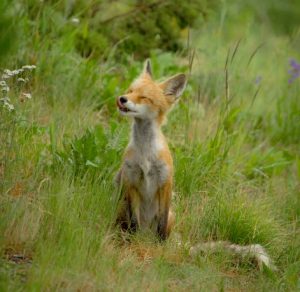
What about dry food and processed food, and my dog's health?
Dry and processed foods seem so quick, convenient and cheap to serve up; and raw foods at first glance seem difficult and expensive! Over time, we have fallen under the spell of the pet food company marketing that describes processed food as complete nutrition, “especially for a growing puppy”!
We’ve been looking into this, and the facts may surprise you. We would encourage you to do a little personal research too and consider the following questions. What ingredients are in your dog’s food; do you know what those ingredient words mean? What is meat ‘meal’ and why is it NOT meat at all? Is the cereal and grain that is abundant in processed foods good for my dog? Why do synthetic vitamins and minerals added to processed foods have little nutritional value? Why do dogs on dry food diets often have poor stomach acid levels and gut bacteria imbalances? What pet health issues can be related back to long-term poor diets?
Facts around dogs food include: dogs’ energy comes from protein and fat, carbs are excess and stored as fat; poor diet can lead to obesity, diabetes and hormone imbalances, benign tumours and cancers, skin and gut allergies, dental disease, kidney and liver diseases, just to name a few; dogs need moderate amounts of healthy fats; cheaper intensively farmed grain-fed meats create imbalances which are associated with behaviour issues and depression, obesity, cancer and arthritis!
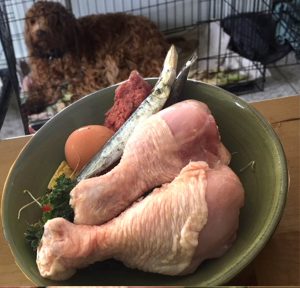
Will quality or raw food cost me more?
Wow! Look at that list of health issues and imagine the cost of a poor diet to your wallet and your dog’s quality and length of life. And then consider how little your pet’s health would really cost if it mostly depended on a healthy balanced quality diet alone, without lifetime expensive vet treatments and medicines.
Cost of feeding a medium Cobberdog good quality raw diet would be from $7 to $10 per day.
If you choose to source a fully balanced, safe and healthy dry food kibble, this will be equivalent in cost to a raw food diet, and must be offered with fresh water available.
More information please?
There is also a lot of great information on this subject freely available; check out the Lyka and Raw4Paws website, including food hygiene practices that should be applied with handling all raw foods - for both humans and pets!
Some other good quality balanced dog food suppliers that we have sourced locally or online are Ziwi, Whoa Nelly, Proudi and Organic Paws.
The food that we now offer our puppies after weaning is Lyka wholefoods prepared puppy meals; and some quality kibble.
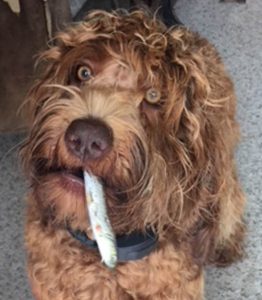
FEEDING YOUR COBBERDOG PUPPY
Water
Fresh clean water should be available at all times through the day. Don’t give water or food after 5pm while settling your puppy in and toilet training, this will help reduce night time toilet needs. Please don’t give your puppy cow’s milk as it will cause diarrhoea.
Food for your new puppy
If changing pups diet this needs to be done very slowly. It is very stressful for pup coming to a new home and diet changes may cause diarrhoea which will weaken pups immune system. We recommend a slow change if you want, after pup has been with you at least one month.
- Your Cobberdog puppy has been weaned onto a balanced lightly cooked wholefood diet from Lyka (see information and link above) and quality kibble. Continue to feed your puppy a healthy balanced diet to avoid health problems as they grow.
- Your puppy is used to having Lyka food at Ridgy Didge for their afternoon feed. Sardines, fish, free range eggs and raw chicken carcass are good foods to alternate if you wish. All meat should be free-range grass-fed and contain good healthy fats. For a more convenient raw diet you can buy Lyka wholefood meals (see above) or Barf pattis or other supplier foods as listed above.
- We keep our dogs grain-free for the whole of their lives; grains and carbs cannot be used for energy by dogs, and are simply stored as fat!
- Pup will also enjoy a bone to chew on or a pig's ear, especially if you are away for a while. Bones will help keep pups teeth and gums healthy and save you dental expenses.
Feeding for puppy's growth
- Remember always feed according to weight and growth rate. Speak with your vet about your dog’s needs.
We still weigh our pups weekly & weigh all their meals so they are getting the correct amount each day. We recommend you keep an eye on your pups body shape and weight. Weigh your pup each week and adjust food amount accordingly. If your pup is always hungry you can give a bit more or give Keiffer yogurt at lunch time. If pup is getting fat then decrease the amount. Puppies need to be fed about 7% of their body weight per day till they are around 4 to 5 months then down to 5%. Feeds for pups are divided into two feeds per day. After 12 months when fully grown pup needs only 3% to 4% once per day. - Take away what your puppy doesn't eat after 10 minutes, and discard raw food leftovers. The Australian Cobberdog is generally not a greedy breed, and will usually only eat until satisfied. Beware that this may change if you have another dog that is greedy and food competitive.
Can I buy commercial Raw Foods?
There are commercial raw foods that can meet your dog’s needs too if it makes raw feeding easier for you; freeze dried and frozen options. These can be safely sourced from ethical companies like Lyka (see top of page), Raw4Paws, Organic Paws, Ziwi, Frontier Pets, Whoa Nelly and Proudi. We also want to mention Inner Wolf here on the Sunshine Coast, where we have bought great raw food; they stock Raw4Paws, ethically farmed sardines and much more, all at reasonable prices.
If you commit to a mostly raw diet for your dog, please note! Dogs that have been on a dry food diet must transition to raw food over a period of time. They can be at risk of developing real gut issues from new raw diets because their stomach acid imbalance and disturbed gut bacteria may not cope with the change. Transitioning does NOT mean mixing processed foods with dry foods, this is never recommended.
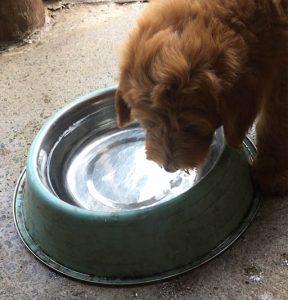
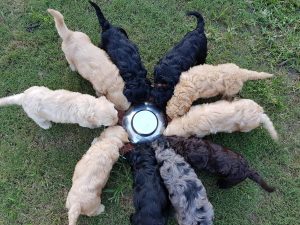
Precautions around food
Bones - NEVER give any form of COOKED bones.
Cooked bones, especially chicken bones or chop bones, can splinter inside the dog's gut and cause a very big vet bill.
Your dog does need bones for healthy gut and teeth, so use raw bones appropriate for your dog's size, e.g. brisket bones cut to size by the butcher.
See our Blog about Bones for Dogs for lots more information about this.
UNSAFE FOODS: Foods dangerous or toxic to dogs:
Corn can cause bowel obstruction.
Chocolate, grapes, raisins, avocado, onion, garlic, chives, macadamia nuts, xylitol products, blue cheese and all mouldy foods are toxic to dogs.
TREATS: reward to good health!
Make your puppy's treats healthy. You can use a small amount of cheese or dried liver for treats. Don’t feed bread or toast: dogs thrive best on grain-free diets.
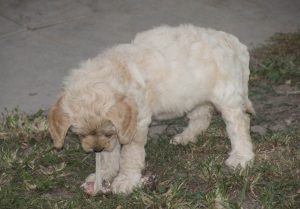
If you would like to adopt a Ridgy Didge Australian Cobberdogs please read our Puppy Adoption page with all details about applying.
